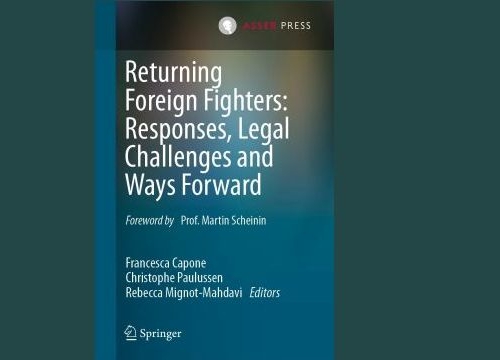Book Launch – Returning foreign fighters: Responses, legal challenges and ways forward
Event


T.M.C Asser Institute

In her recent appearance at the Geneva Academy in April 2023, the United Nations (UN) Special Rapporteur on human rights and counterterrorism Fionnuala Ní Aoláin painted a grim picture of the Syrian camps and other locations where thousands of foreign men, women, boys and girls remain in a state of limbo following the military defeat of the Islamic State (ISIS) back in 2019. Though the number of foreigners left in Syria has slowly decreased over time, many states have remained reluctant to acknowledge any responsibility to repatriate their citizens, pointing to jurisdictional limitations, challenges in prosecuting them at home, as well as reintegration concerns. In the face of these challenges, some states have instead resorted to dramatic measures such as depriving their citizens of their nationality. In parallel, many foreign individuals who had joined ISIS at the height of the armed conflict in Syria and Iraq have in fact managed to return home by their own means, forcing their states of nationality to deal with a range of challenges, in particular legal ones.
Against this is the background, Francesca Capone, Christophe Paulussen and Rebecca Mignot-Mahdavi released in March 2023 the edited volume ‘Returning foreign fighters: Responses, legal challenges and ways forward’ published at the T.M.C Asser Press.
Following their previous edited volume, ‘Foreign Fighters under International Law and Beyond’ (T.M.C. Asser Press, 2016), one of the most important academic contributions in the area, this new volume provides insights into how the international community and individual states have responded, over the past years, to the phenomenon of foreign fighters, in particular when it comes to their return home. Across 11 chapters written by some of the top experts on the question, the book looks into the variety of policies and legal issues arising from states’ responses. It also addresses some of the broader lessons one should draw from this particular instance: the counter-productive nature of counter-terror policies that violate the rule of law, the risks to human rights and international law posed by policies adopted in the wake of supposed emergencies, and the need to scrutinize states’ actions even in sensitive areas that affect states’ sense of security and sovereignty. Ultimately, the book also attempts to imagine what the future could, and should, look like, when it comes to the participation of foreign nationals in armed conflicts and terrorism.
In this book launch, co-organized with the T.M.C. Asser Institute, the book’s editors will discuss with leading experts and practitioners the state of research in the area of foreign fighters and their return, some of the volume’s primary findings regarding both specific aspects and broader questions of international law, and how it hopes to contribute to the wider policy conversations on how to address the phenomenon of foreign fighters.
Moderation
- Cyprien Fluzin, Teaching Assistant, Geneva Academy
Panelists
- Francesca Capone, Istituto DIRPOLIS of the Scuola Superiore Sant’Anna
- Paola Gaeta, Professor of International Law, Geneva Graduate Institute and Faculty Member, Geneva Academy
- Christophe Paulussen, T.M.C. Asser Instituut, ICCT The Hague
- Rebecca Mignot-Mahdavi, Manchester International Law Centre, University of Manchester, School of Law in Manchester
Concluding Remarks
- Frank Bakker, T.M.C. Asser Press








